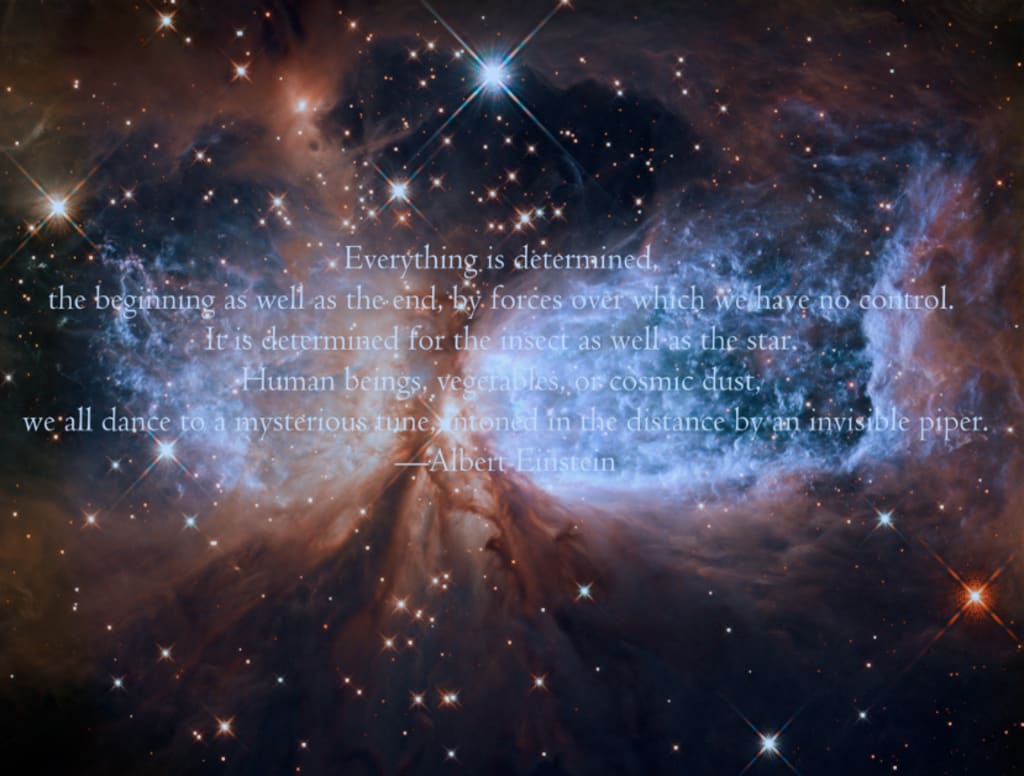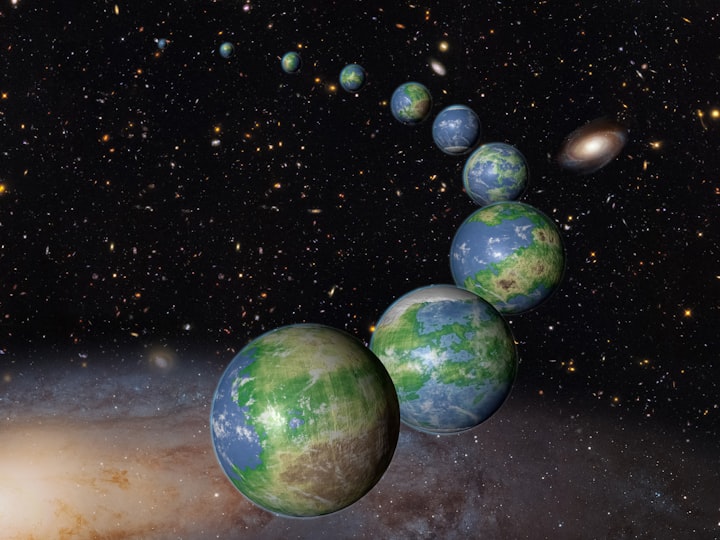Divine Decree vs. Free Will
The condition of our continuance

For centuries, people of all religions have debated the existence of fate. It’s become one of the most common conversations to be had despite the ever changing religious beliefs of the world. Yet, no one can seem to come to an agreement. It’s a topic that creates passionate arguments within science and all regions of religion, whether it be within the one most common God, or all the Gods in history that are now obsolete. It seems that most people believe free will and fate work together hand in hand, guiding each other along a path, where fate only intervenes when necessary. Unfortunately people fail to see that these philosophical constructs are contradictory to each other. Their purposes reverse that of the other which in turn diminishes their value of existing in the first place. If they mutually exist then their purposes become invalid just by the mere presence of one negating the function of the other. So either they both exist with no true function whatsoever, or only one exists. And if only one exists, then rationally it must be fate.
Imagine a keypad on the outside of a vault door. In order to open the door and get into the vault, you must enter a 6 digit passcode consisting of 6 numbers that cannot be repeated. The odds of you guessing the passcode right the first time is near impossible. Incredibly impossible, in fact, because there are one million different potential number variations. You can’t just guess the number, because the odds are not in your favor. There are too many variables to take into consideration and the numbers are your variables in this situation. Just the numbers, and nothing else. Too many variables would have to come to together in order for you to guess that passcode right the first time, or the hundredth time.
Now think about these variables on a larger scale. Think about you as a person. Think about all the people you know and places you’ve been. Next, think about all the people you know and who they know and where they’ve been… and so on. Think of the world in its entirety and how many different things are going on all at once. Imagine the variables that would need to all come perfectly together in order for one single situation to happen. Imagine that on a universal level. Because that is what life is… we exist on a universal level. The universe itself is infinite, which would make the variables infinite and I find it completely impossible for these variables to constantly come together arbitrarily for each person in existence on a regular basis.
The Stanford Encyclopedia of Philosophy defines free will as a philosophical term of art for a particular sort of capacity of rational agents to choose a course of action from among various alternatives. Or, to put it simply, the ability or discretion to choose for yourself. You see the variables and you make the choice, and each choice will lead to another situation in which you will also need to make a choice. Our decisions are what fulfill the metaphysical requirement of being responsible for our own actions, rather than blaming our actions on a higher power, therefore avoiding responsibility.
However, I find that the idea of fate or destiny being a way to avoid responsibility to be tremendously narrow-minded. When we talk about fate and destiny, what we are actually referring to is determinism. According to The Information Philosopher, determinism is the philosophical idea that every event or state of affairs, including every human decision and action, is the inevitable and necessary consequence of antecedent states of affairs. In a much stricter sense, pre-determinism is a similar belief, but believes all determined things, past and future, originated at the beginning of creation from the origin of the universe. It was an ancient Greek philosopher named Democritus that believed deterministic laws controlled the motion of all atoms, and that everything merely consisted of atoms in a void. His mentor Leucippus said, "Nothing occurs at random, but everything for a reason and by necessity." This is the basic foundation of determinism, and an important lesson I think many adverse to it miss. It’s is about finding meaning in the world around us that inevitably connects all of our lives together on a grander scale. A cause and effect where what you do will impact the life of another, and how our “choices” in some way are all connected. It’s a conviction that considers how our lives are relevant to each other.
When it comes to their mutual existence, I always turn to The Law of Excluded Middle, which declares that a statement is either true or false. The Law of Excluded Middle can also easily be derived from The Law of Non-Contradiction, which states This cannot be This and That at the same time and in the same sense. A is A and A cannot be not A. Which is also similar to the semantic principle of bivalence. Something cannot exist and not exist at the same time. These are within the confines of contradiction. So if variables are real (which they are), and if variables are infinite (which they are), and it would be irrational for them to continuously come together unsystematically (which it is), then there must be something luring these variables together in order for them to happen in the way that they happen. Subsequently, if something is pulling them together, that would imply the existence of determinism. If determinism is active, then rationally, according to the laws above, free will cannot be active because it would cancel determinism out. Consequently this implies if one thing is fate, all things must be fate. Likewise, if one thing is free will, all things must be free will. Though as I said, taking into account infinite variables and the mathematical impossibility of them coming together, this leaves more rational and logical room for determinism to nullify the existence of free will.
Setting aside the argument on variables, we can instead take a look at human evolution. Whether you entertain a belief in God or not, evolution is science which is based around years of research and facts that cannot be disputed, but only develop more thoroughly in time. Stephen Hawking is one of the most acclaimed theoretical physicists and cosmologists the world has ever known, discovering more about the universe than anyone could have ever imagined. Despite his deep roots in the science community, he has repeatedly jumped to the defense of determinism, stating, "The initial configuration of the universe may have been chosen by God, or it may itself have been determined by the laws of science. In either case, it would seem that everything in the universe would then be determined by evolution according to the laws of science, so it is difficult to see how we can be masters of our fate.” This alone is a thought-provoking and quite compelling claim to contemplate. Along with other quotes by Hawking, it is implied that the brain and body follow the laws of science, but free will is an agent outside of science which would mean the living will of man cannot freely choose his actions because we are biological machines, rooted in the same laws of physics as the orbit of planets. Therefore, if free will is an agent outside of science then the only plausible explanation for existence is the idea of determinism.
Although Hawking is an extreme determinist, some scientists have attempted to dispute the deterministic beliefs using Hawking’s own multiverse theory, suggesting the two are contradictory. They argue if we live in a deterministic universe where the multiverse theory is true, then one of two things must be true for the other worlds:
- If events are pre-destined by a deterministic universe, then any specific event that emerges must also emerge exactly the same in every other world, e.g. if I am drinking a coffee in this universe, then given this is the only singular path of causation in a deterministic universe, then in every other world I must be doing the exact same thing—drinking coffee. Which makes the other worlds obsolete since they do not vary from this world.
- Pre-existing events can cause limitless, different outcomes in other worlds, which in turn would mean it is not pre-deterministic at all since only free will and random acts can create random outcomes; and random limitless outcomes in other worlds are a contradiction for a deterministic universe.
As convincing as this argument may appear to be, no one seems to be taking into account that in a deterministic universe maybe the outcomes of other worlds are also pre-determined to be different. That in each world, this straight and strict path of determinism is adapted for each individual world. This too could mean the universe, using the multiverse theory, has created its own perfect pre-deterministic balance that all take place in modified versions of the world we live in. Or maybe we are one of many modified worlds.
That being said, we should take a look at the presence of the soul. No matter what religion your faith is in, your scientific knowledge, or your belief/disbelief in destiny, the consensus still appears to be that each living thing does in fact contain a soul. The soul is universal energy, and energy cannot be broken down or destroyed. Energy is infinite and indestructible. The soul is a piece of universal energy that we carry around inside of us at all times. It’s important to recognize what the means, that perpetual energy inside of our bodies is connecting us to the universe. If we have a soul, it’s for a reason. It’s not there for nothing. It was put within all of us with purpose, and one purpose may very well be to guide our vessels (bodies) into carrying out their divine decree. In a way, this could translate as a form of free will. Rather than free will being an illusion in the existence of fate, let us consider it altered. Free will isn’t an illusion, but we have the illusion of free will. We unknowingly do what we are meant to do, which gives off the impression of choice and decision. This doesn’t absolve us of mistakes or responsibility. We may have been meant to make these choices, whether right or wrong/bad or good, but they’re a part of a process that allows the soul to grow and become stronger for the next life (because after all, if the soul is infinite energy unable to be destroyed, then that energy has to go somewhere once the body dies. But that’s a different topic all together). This is also part of a universal balance. For every action, there is an equal and opposite reaction (Newton). Each person is neither indefinitely good nor bad. We just act as such depending on the situation. Our concept of right and wrong and our morality can be put to the test depending out what type of situation we find ourselves in at any given point in time. Denying free will in support of destiny doesn’t negate responsibility, it just reevaluates the concept of responsibility and the purpose of the action in the first place. We did a bad thing, but why? Cause and effect, what led up to these moments? What was the purpose of my offense?
A woman awakes in the morning and decides she wants to wear her red coat today. After she dresses, she looks in the closet but is unable to find her red coat. She checks her room, the laundry, her car, but can’t seem to find her red coat anywhere. After looking for 10 minutes she decides to wear her blue coat instead. The woman leaves the house on her way to run errands. As she’s driving through the intersection, a drunk driver runs the stop sign and slams into her. She dies. Why did this happen? Was this a coincidence? An unforeseen act of free will? When you take into account all of the variables that would have needed to come together in order for her to be in that exact moment at that exact time, how could it possibly be free will? Had she not have wanted to wear the red coat, she would have been out the door 10 minutes sooner, which means she would not have been in that exact spot at the time the man ran the stop sign. Had she continued to look for her red coat, she wouldn’t have been in that spot. Had she done her errands the day before. Had she eaten breakfast. Not just her, but the man as well who ran the stop sign. Why did he run the stop sign? Because he was drunk. Why was he drunk? Did he have a bad day? Did his colleagues insist he come out to drink with them? Was there a party? Was he depressed? Is he an alcoholic? Then… why did he have a bad day? Why did his colleagues insist he come out drinking? What was the party for? What is making him depressed? What turned him into an alcoholic? Did his girlfriend break up with him? Did he get fired from his job? Did his wife pass away? Why did his girlfriend break up with him? Why did he get fired? How did his wife die?
These are all questions that have answers, and they are important to the chain of events of the situation. Take into consideration all of the things that needed to come into play to get these two people at this one specific spot at that specific time. How is any of that a random act of free will? Some may say “it was his choice to drink.” Was it though? On a conscious level, maybe, yes. Reverting back to the illusion of free will where we are making decisions consciously but really we are just fulfilling the divine decree of the universe. He may have made the choice to drink, but therein that is a reason and a purpose. A lifetime of actions and reactions, cause and effect, needed to unfold in order for them to be that that exact point at that exact time.
If free will as we conceive it co-existed with fate, then that would mean the universe (or whichever God you believe in) would need to reroute entire lifelines. If this woman was meant to get married, have children, and one of those children finds the cure for Alzheimer’s, but now she’s dead even though she wasn’t meant to die, then everything she was meant to have, every person she would ever know and their lives and the life of her husband would all be rerouted. That child who cured Alzheimer’s now doesn’t exist because his father never married his mother. This action of her searching 10 minutes for the red coat is an action that directly affects the lives of many people, and the way the lives of others play out. Her no longer existing forces fate to reroute entire lifelines, all because the existence of choice. Because one of them made a choice. Fate’s big plan was marriage and a magnificent kid. Due to free will co-existing, that life no longer is an option. So what is the point of either? What is the point of fate if it can so easily be reversed? What is the point of the grand scheme and the brilliant design if such small insignificant decisions can counteract the entire process? It doesn’t make sense for either of them to exist if they continue to cancel each other out. Their co-existence creates a trivial world full of chaos.
As Voltaire once expressed, “Everything happens through immutable laws…everything is necessary. ‘There are," some persons say, ‘some events which are necessary and others which are not’. It would be very comic that one part of the world was arranged, and the other were not; that one part of what happens had to happen and that another part of what happens did not have to happen. If one looks closely at it, one sees that the doctrine contrary to that of destiny is absurd; but there are many people destined to reason badly; others not to reason at all, others to persecute those who reason.”
For those who solely believe in free will, they would find my interpretation of divine decree above to be a form of acceptance of this man's recklessness and irresponsibility. But I believe this naïve idea ignores the common concept of humanity. Whether or not something is destined doesn’t automatically abolish the presence of humanity. People are still people, with thoughts, feelings, and ideas; just because we may be meant to think and feel certain things doesn’t mean they aren’t any less real or valuable to the person we are. Yes, there is a big picture, but these small details matter just as much because it’s the small details that truly create the sum of our whole. The drunk driver in the example above is not relieved of his moral responsibility simply because cause and effect of destiny’s design led him to make such a terrible mistake. We still exist as people, with functioning brains capable of thought and reason. Deep inside we can believe that this happened because it was meant to, as awful as it is, but that doesn’t remove our natural instinct to care. In that same sense, do not forget the wars that have been fought for centuries in the name of God over Christian beliefs, for what the bible says to be the word of God. Centuries of persecution, endless still in our current generation. People use the word of the bible and the name of God as an excuse to act in whatever manner they choose, presuming that their pious principles make them free from moral repercussion. These are some of the same people who insist that determinism is a coward’s way of evading consequences.
When it comes to placating moral responsibility, I don’t believe the existence of destiny negates that. The existence of destiny, if anything, provides a deeper sense of purpose. As human beings, we’re aware we are imperfect. What the belief in determinism does is help give us solace for our imperfections where most may only find disorder without meaning. A cement that binds the bricks together so that we can continue to build a structure that won’t collapse. There is more than enough in the way of specifics and circumstance to indicate the plausible existence and continuation of a deterministic universe, whether it be from its ties to the universal energy inside us, biological law, or the infinite variables of mathematics. Determinism isn’t a ploy to avoid responsibility; it’s a divine doctrine that provides purpose for the problematic and inevitable moral responsibilities the universe has presented each of us with.
Bibliography
CARM. "Three Laws of Logic." The Bible. Christian Apologetics and Research Ministry.
Holbling, Hugo. The Galilean. 13 June 2005.
McGettigan, Timothy. "Many Worlds, but Only One Reality: Stephen Hawking and the Determinist Fallacy - The Socjournal." The Socjournal. Sociology.org, 5 Nov. 2012.
NASA. Star-Forming Region S106. 2011. HubbleSite.
O'Connor, Timothy, "Free Will", The Stanford Encyclopedia of Philosophy (Fall 2014 Edition), Edward N. Zalta (ed.)
Physics Classroom. "Newton's Third Law." Newton's Third Law.
Ross, Alf. "Chapter 5: On Determinism and Morality." On Guilt, Responsibility, and Punishment. Berkeley: U of California, 1975. Print.
Stanford University. "The Law of Excluded Middle." An Introduction to Philosophy. Stanford University.
The Information Philosopher, “Determinism” 29 November 2012
Various Authors. "Quotes Disaffirming Free Will and Affirming Determinism by the Famous." Quotes Disaffirming Free Will and Affirming Determinism by the Famous. Casual Consciousness.
About the Creator
Seneca Basoalto
I like bad words, old men, and heavy basslines
Background in the backstage music/movie scene
Iberian poet
Publications in England, Scotland, Australia, and USA through NAILED Magazine, Terror House Magazine, Utterance Journal, and many others






Comments
There are no comments for this story
Be the first to respond and start the conversation.